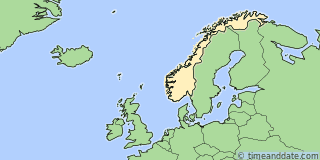Mar 30, 2025, 2:00 am
Mar 27
Forward 1 hour
Mar 27, 2016 - Daylight Saving Time Started
When local standard time was about to reach
Sunday, March 27, 2016, 2:00:00 am clocks were turned forward 1 hour to
Sunday, March 27, 2016, 3:00:00 am local daylight time instead.
Sunrise and sunset were about 1 hour later on Mar 27, 2016 than the day before. There was more light in the evening and less light in the morning.
Also called Spring Forward, Summer Time, and Daylight Savings Time.
Oct 30
Back 1 hour
Oct 30, 2016 - Daylight Saving Time Ended
When local daylight time was about to reach
Sunday, October 30, 2016, 3:00:00 am clocks were turned backward 1 hour to
Sunday, October 30, 2016, 2:00:00 am local standard time instead.
Sunrise and sunset were about 1 hour earlier on Oct 30, 2016 than the day before. There was more light in the morning and less light in the evening.
Also called Fall Back and Winter Time.
More info:
The European Union Debates DST
DST in Europe Ends Oct 30
When Does DST Start and End in Norway?
The DST period starts on the last Sunday of March and ends on the last Sunday of October, together with most other European countries.
Both continental Norway, which includes the capital Oslo, and Svalbard, a Norwegian archipelago in the Arctic Ocean, use Central European Time (CET) as standard time. When Daylight Saving Time (DST) is in force, Central European Summer Time (CEST) is observed.
Daylight Saving Time History in Norway
- Norway first observed Daylight Saving Time in 1916.
- Norway has observed DST for 59 years between 1916 and 2024.
- Previous time with no Daylight Saving Time was 1979.
- See Worldwide DST Statistics
Daylight Saving Time has been introduced, discontinued, and re-introduced quite a few times during the 20th century. When the measure was reinstated in 1959, controversy erupted, so in 1965, DST was again abolished. However, it was re-introduced in 1980. Today, Norway follows the EU’s daylight saving schedule.
